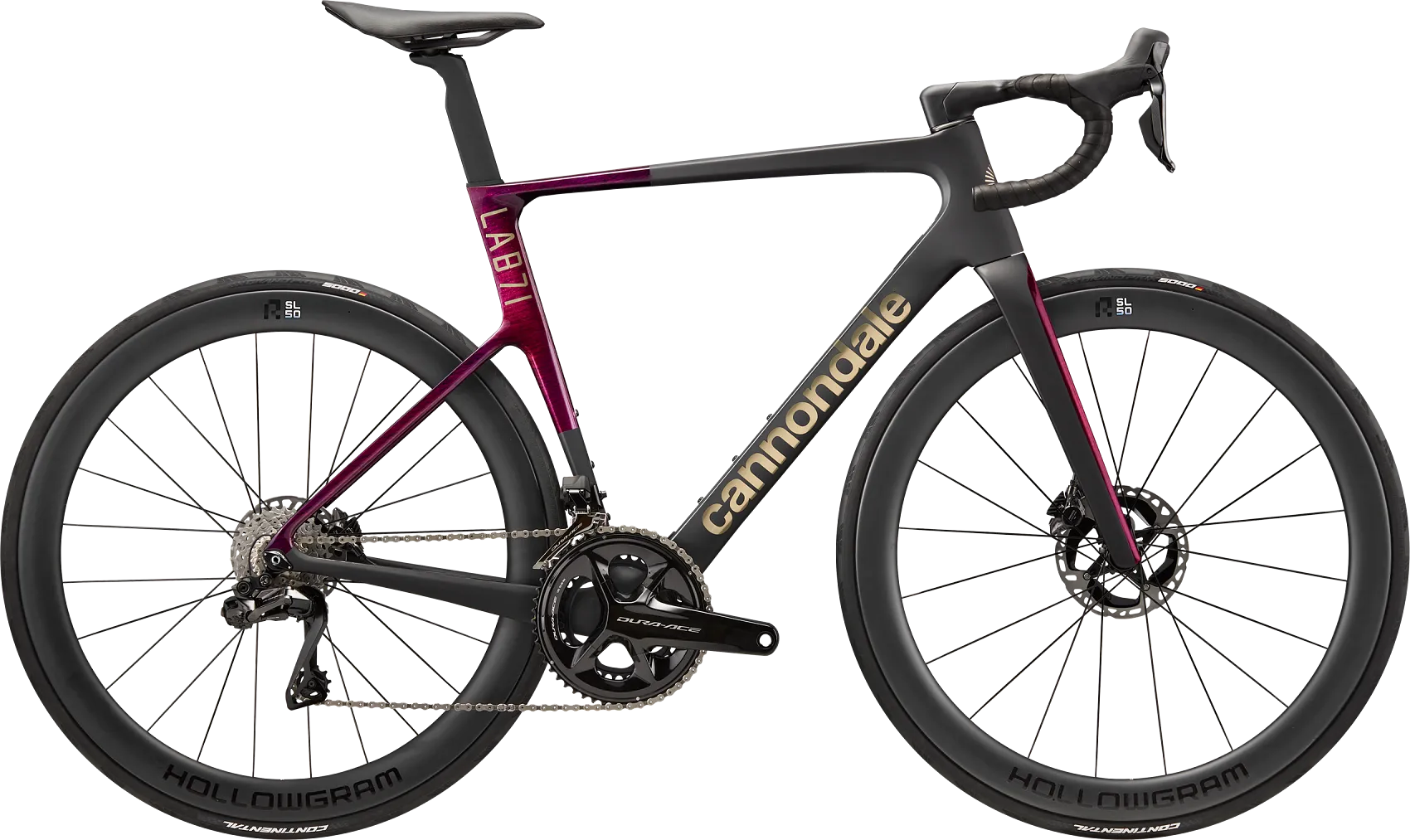This article compares the differences between the Cannondale Supersix Evo and Orbea Orca.
The comparison covers the model lineups, specifications, and retail pricing. It compares the carbon fiber technology (Cannondale BallisTec vs Orbea Monocoque (TorayCa) Carbon) and frameset technologies on each bike.
The objective is to provide you with a clearer understanding of Cannondale Supersix Evo vs Orbea Orca before making the purchasing decision.
| Cannondale Supersix Evo | Orbea Orca | |
|---|---|---|
| Type of bike | Aero | Aero |
| Frame material | CFR CF SLX carbon | OCLV 800 carbon OCLV 500 carbon |
| Frame sizes | XXS, S, M, L, XL, XXL | 44, 49, 52, 54, 56, 58, 61, 64 |
| Groupset | Shimano, SRAM (12-speed) | Shimano, SRAM (12-speed) |
| Brakes | Hydraulic disc | Hydraulic disc |
| Cabling | External | External |
| Price (USD) | $4,499 to $9,499 | $5,199 to $13,199 |
Cannondale Supersix Evo

The Cannondale SuperSix EVO is an all-rounder race bike.
For years, the Cannondale SuperSix EVO been known for being light, fast, and stiff on the climbs. At one point, many weight weenies were building sub-6kg bikes with the Cannondale SuperSix EVO.
In 2023, Cannondale launched the ultra-premium LAB71 version featuring their latest Series 0 (LAB71) carbon, taking over from the Hi-MOD version as the top-of-the-line offering. Three carbon grades are now used for the SuperSix EVO; BallisTec LAB71, BallisTec Hi-MOD, and BallisTec.
All Cannondale SuperSix EVO models are now electronic shifting and disc brake only. The flagship LAB71 models are equipped with Shimano Dura-Ace Di2 only.
| Model | Frame material | Groupset | Wheelset | Retail price (USD) |
|---|---|---|---|---|
| Cannondale SuperSix EVO LAB71 | LAB71 (Series 0) carbon | Shimano Dura-Ace Di2 (R9200) | HollowGram R-SL 50 | $15,000 |
| Cannondale SuperSix EVO Hi-MOD 1 | Hi-MOD carbon | SRAM Red eTap AXS | HollowGram R-SL 50 | $13,050 |
| Cannondale SuperSix EVO Hi-MOD 2 | Hi-MOD carbon | Shimano Ultegra Di2 (R8100) | HollowGram R-SL 50 | $8,300 |
| Cannondale SuperSix EVO 1 | Carbon | SRAM Force eTap AXS | HollowGram R-S 50 | $6,500 |
| Cannondale SuperSix EVO 2 | Carbon | Shimano Ultegra Di2 (R8100) | HollowGram R 45 | $5,500 |
| Cannondale SuperSix EVO 3 | Carbon | Shimano 105 Di2 (R7100) | DT Swiss R470 | $4,500 |
Cannondale SuperSix Evo vs others
Orbea Orca
Cannondale vs Orbea carbon fiber
Cannondale BallisTec Carbon
Cannondale BallisTec is a proprietary carbon fiber construction technique used to manufacture Cannondale bicycle frames.
The BallisTec carbon technology utilizes advanced engineering and construction methods to create frames that balance strength, stiffness, and weight. It involves the precise layering and placement of carbon fiber sheets, which are impregnated with epoxy resin and then molded under high pressure and temperature.
The BallisTec carbon is available in three grades.
- BallisTec LAB71 is Cannondale’s latest advancement in carbon construction. Also known as the Series 0 carbon, LAB71 is designed to be the lightest and most advanced, taking over from the Hi-MOD carbon. LAB71 frameset delivers exceptional performance, weight reduction, and overall ride quality.
- BallisTec Hi-MOD stands for High-Modulus, which refers to using high-modulus carbon fibers in the frame. This results in a stiffer and lighter structure, providing enhanced power transfer and a more responsive ride feel. Hi-MOD carbon frames are designed for riders who prioritize performance, stiffness, and weight savings.
- BallisTec is the standard carbon in Cannondale’s frames, which offers a balance of weight, stiffness, and durability at more affordable prices.
Orbea Monocoque (TorayCa) Carbon
Orbea uses carbon fiber from TorayCa in their bikes. It’s one of the handful of bike manufacturers that uses a monocoque carbon fiber construction, resulting in a lighter and stiffer frameset. The two most prominent types of carbon used in Orbea’s bike frames are OMX (T1100K) and OMR (T800) carbon.
- OMX (Orbea Monocoque X) carbon is Orbea’s top-grade carbon fiber, with the ultimate blend of stiffness, lightness, and strength. Monocoque refers to a type of construction technique where the external skin supports the structural load, which, when applied to bike frames, results in a balance of strength and weight. Due to its high manufacturing cost, OMX carbon is typically reserved for Orbea’s top-tier models.
- OMR (Orbea Monocoque Race) is the standard carbon composite used by Orbea. While OMR doesn’t match the absolute performance capabilities of OMX, it offers a fantastic performance-to-value ratio. This makes it a great choice for riders looking for top-notch performance without the premium price tag of the top-grade OMX carbon.
Frameset technologies and innovations
Cannondale Supersix Evo and Orbea Orca framesets incorporate advanced technologies to enhance their bikes’ performance and ride characteristics.
Here’s an overview of the technologies used in each bike model.
Cannondale Supersix EVO
| Name | Description |
|---|---|
| BallisTec carbon construction | A proprietary manufacturing technology that uses meticulously woven carbon fiber material to create strong and lightweight bike frames. The goal is to maximize the stiffness-to-weight ratio, providing riders with a responsive and efficient ride experience. Available in three grades; BallisTec LAB71, BallisTec Hi-MOD, and BallisTec. |
| Delta steerer | A unique steerer tube design for seamless cable integration to, reduce frontal area and drag. |
| Bottle integration | Integrated bottle cages and bottles designed for improved aerodynamics and streamlining. |
Orbea Orca
| Name | Description |
|---|---|
| Monocoque Carbon Construction | Monocoque carbon construction is a process that uses the most advanced carbon technology to create the most sophisticated bike frames possible. Monocoque means that the frame is made of a single piece of carbon fiber, rather than multiple pieces joined together. This ensures that the frame is lighter, stiffer, and stronger, as there are no weak points or excess material. Orbea has two grades of carbon fibers; OMX (Orbea Monocoque X-Light) and OMR (Orbea Monocoque Race). Orbea also uses a bladder molding technique with EPS (expanded polystyrene) forms and PU (polyurethane) inserts to prevent wrinkles and gaps in the carbon layers, which can compromise the quality and durability of the frame. |
| ICR Plus | This stands for Internal Cable Routing, which is a system that routes all the cables neatly through the bar, stem, and headset for a clean look and improved aerodynamics. ICR also makes it easier to maintain and service the bike compare to other bike brands’ solutions. |
| Powerspine | Powerspine is a frame design technology that enhances the stiffness and power transmission of the bike. The Powerspine is the lower spine of the frame that handles the large majority of torsional and lateral loads. This means that the frame is stiff in the right places, which results in direct power transfer to the rear wheel and more efficient pedaling. The Powerspine also contributes to the lightness and aerodynamics of the Orca, as it eliminates unnecessary material and reduces drag. |
Where to buy
Cannondale retailers
- Cannondale retailers. Use this tool to find your nearest Cannondale retailers.
Orbea retailers
- Orbea retailers. Use this tool to find your nearest Orbea dealers.

Bernard Lu has 7+ years of experience working in a bicycle shop, overseeing the retail and workshop operations. He’s a qualified bicycle mechanic who understands a cyclist’s needs and speaks the same cycling lingo.
If you meet him at the cafe, he will happily talk to you for hours about all the intricacies of bikes and cycling tech. Just buy him a coffee next time you see him.